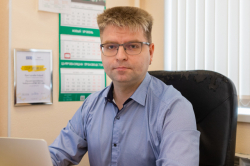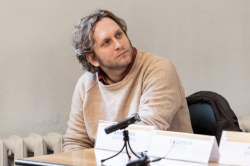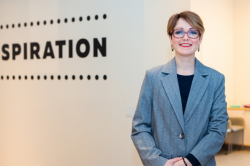The participants of ITMO.Mentors – Master’s and PhD students of the university – helped lecturers prepare teaching material and conduct lectures and practical classes on a variety of subjects. The jury’s choice fell on three top participants: Artem Petrenko, a third-year PhD student at the Institute of Advanced Data Transfer Systems; Alena Bokareva, a second-year Master’s student at the Faculty of Infocommunication Technologies; and Margarita Volf, a second-year Master’s student at the Faculty of Energy and Ecotechnology. The winners received 100,000-ruble grants that can be spent on educational purposes, such as acquiring a new profession, increasing their qualification, or taking a short-term course.
The jury also awarded special merch prizes to two mentors who worked on courses taught in English: Daniil Bobylev, a second-year PhD student at the Faculty of Physics, and Khaldoon Nasser, a third-year PhD student at the Faculty of Photonics.
Artem Petrenko
PhD student at the Institute of Advanced Data Transfer Systems
Artem Petrenko. Photo by Dmitry Grigoryev / ITMO.NEWS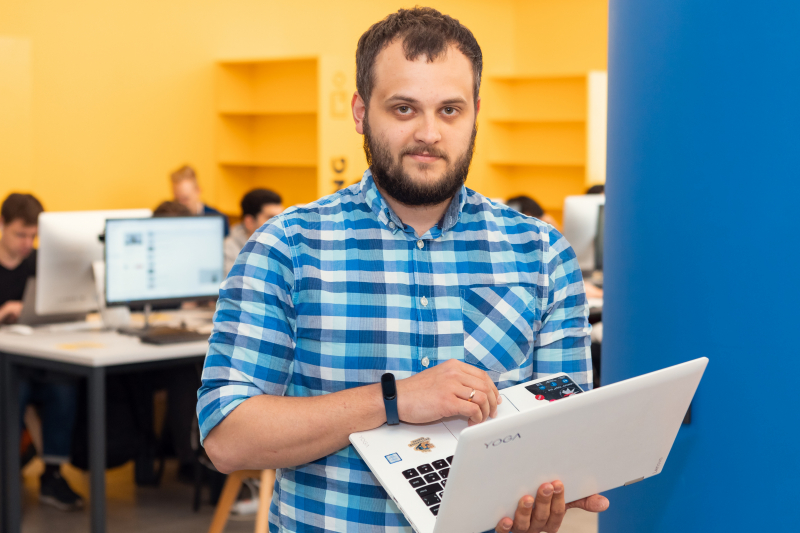
I joined a PhD program so that I could learn about teaching and education. My curriculum already includes classes that enhance our teaching skills, but I wanted to take additional professional development courses, too. So, when ITMO.Mentors launched, I decided to take part. From the program, I learned about teaching design, soft skills, and how to organize classes – this knowledge really helped me and still does. There was another reason why I applied: I wanted to gain some practical experience as a lecturer. My supervisors used to invite me to their classes so I could tell students about my research experience; now, I can do that on my own.
The program’s structure
Starting in September 2020 and until May 2021, I assisted Evgenii Kolodeznyi, an associate professor at the Institute of Advanced Data Transfer Systems, in teaching the course Introduction to Professional Activity at the Faculty of Nanoelectronics. At the course, first-year students learn about the applications of various optoelectronics devices and the basic principles on which they are based. We also tell students about their future career prospects. The task was a difficult one: to pass on fundamental knowledge and provide practical experience. My responsibilities were to organize tests and practical and lab classes, as well as prepare material and evaluate students’ reports.
By the way, it was my great luck to be paired with Evgenii Kolodeznyi. First of all, he is one of those individuals who try their hardest to innovate the teaching process. Secondly, he really cares about the contents of his classes and making sure that students benefit from them. I was glad to have the opportunity to talk to him about various novel approaches to visualization and interactivity.
When it comes to teaching, I try to follow ITMO University’s mission and values. The most important one for me is to love your students. I understand very well that each of them needs an individual approach. It’s also important to remember that they’ve all come to the university to acquire knowledge and skills. So, I try to structure each class so that you can easily understand its aim and where it’s going. I also treat mistakes with understanding, as they are yet another integral part of learning. It’s the mentor’s responsibility to put students on the right path. For instance, we had an open class during which they had to complete a practical assignment and assess the electrical properties of a laser. Instead of just telling them about the dependencies they were to learn about in the course of this assignment, we “re-discovered” them together. I feel like this approach helped them learn it better than if I’d just read it out to them. Perhaps that’s what the expert jury picked up on.
Benefits of the program
Back when I was still in my capacity as a mentor, I applied to join the university’s teaching staff. In September 2021, I started working as an assistant. This semester, I teach Lighting and Laser Technologies and Assembly of Elements for Data Transfer Systems. In addition to this, I take part in the development of practical training curricula.
Alena Bokareva
a second-year Master’s student at the Faculty of Infocommunication Technologies
Alena Bokareva. Photo by Dmitry Grigoryev / ITMO.NEWS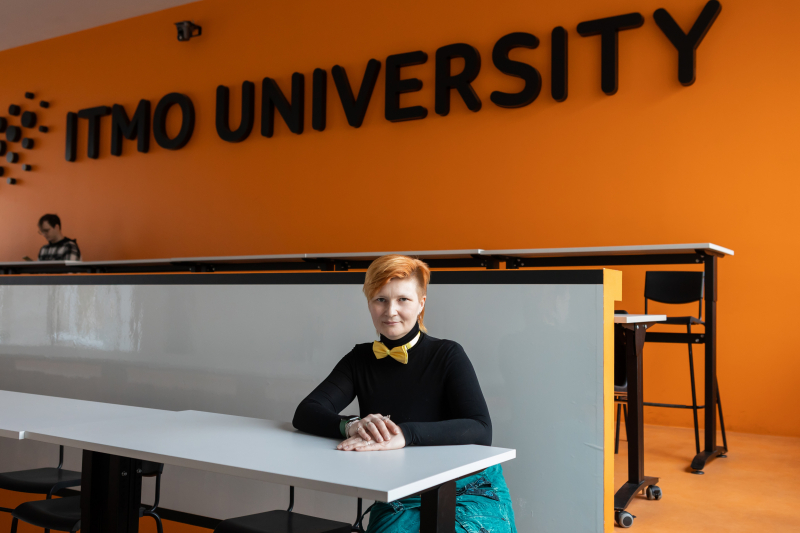
My goal is to become a lecturer at ITMO. Right now I do not fulfill the formal criteria for the position, but I am working hard to earn the necessary skills. That’s why I decided to take part in ITMO.Mentors. I saw it as a chance to showcase my abilities and take a step towards my goal. Moreover, I participated in a similar initiative at the company I used to work at, so I knew what to expect.
The program’s structure
At first, I assisted Vera Tkalich in the course Standardization and Certification: I held part of the practical classes and lectures, while generally staying more of an apprentice. In the next semester, I had more independence. Together with Natalia Gorlushkina we held the course Information and Communication Technologies, where we managed to conveniently divide our responsibilities: she held in-person classes, while I taught the online ones.
We decided to focus on teaching students to work with primary sources of information, as it is important to find a source that you can trust, as well as for which you can tell who and when posted this information. I also tried to help students find their path in life and broaden their horizons – after all, any task we face in life can be linked to infocommunication technologies. For instance, they had the task to compare various messenger apps and write what they would choose about each of them.
It happened that my course had already finished when I was scheduled to have an open class for the contest’s jury. Thankfully, I was allowed to take on another course and Prof. Gorlushkina let me hold another class. I had only three days to prepare for it and, by the way, it was a class I taught to my own groupmates, and with a hardly exciting topic of state standards for mobile apps. To back me up, the professor engaged in the class and at first her somber expression made me nervous. Afterwards, however, she told me it would be a challenge to beat the high standard I set with my teaching. What’s more, my groupmates asked if I could teach all classes, not just this one. At the class, we solved a quiz and worked on a whiteboard in Miro, turning a boring topic into something fun and useful. This approach helped students perform almost flawlessly on the final test.
Benefits of the program
At the start of the program, there were many participants, but as the time went on, fewer of us were left. This is a great opportunity to find out if you are really into teaching and can commit to it. Moreover, I could see what it was like to work in education. Thanks to the program, I completed over a dozen professional development courses. I love learning and it was a great opportunity to explore different courses; I particularly enjoyed Instructional Design. I am planning to enter a PhD program and then, hopefully, I will get to become a lecturer.
Daniil Bobylev
a PhD student at the School of Physics and Engineering
Daniil Bobylev. Photo by Dmitry Grigoryev / ITMO.NEWS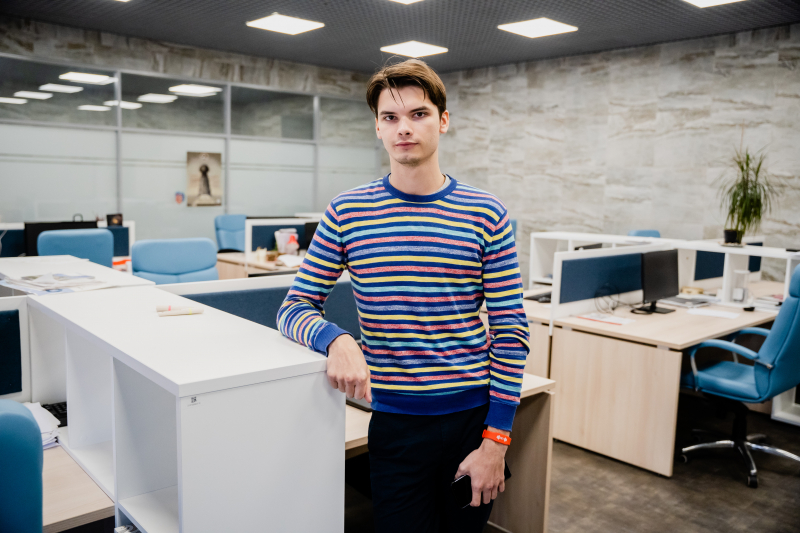
As a Master’s student I would help my supervisor Maxim Gorlach grade homework. Later, when I started my PhD studies, I had the chance to get more involved in educational activities and teach practical classes on my own. At the same time, the university launched ITMO.Mentors and I decided to participate. I think it was a rather timely decision, because I wanted to continue teaching. Moreover, it gave me the chance to join the faculty, get special training, and even win an award as the best mentor.
The program’s structure
My supervisor taught theory for the class Electrodynamics of Metamaterials for Master’s students. I was responsible for practical classes in the course and I had the freedom to choose how to organize them. With my students, we solved problems connected to electromagnetic wave propagation in various media. I put in a lot of time and effort in preparation: I came up with a structure, selected the problems, and identified the solutions that might be unclear to students.
Apart from teaching, I was also attending special classes for mentors, which came in handy when I was planning my classes, especially as the university transitioned to the blended learning format. For instance, I learned about such convenient tools as Miro, Quizizz, and Canvas. I also really liked the tone of the course: it felt like we were guided rather than instructed; moreover, it was concise and unobtrusive. At the end of the course, I was naturally really pleased to get not only a certificate of completion, but also an award. I think the jury was impressed that I held my classes in English.
What next
I like teaching and I plan to keep doing it in the future. That is why I am planning to take part in the competition for open faculty positions. I can feel how this activity keeps me constantly engaged: I often revisit my own studies, analyze problems, and strive to become better at explaining them.
Margarita Volf
a graduate of ITMO’s Faculty of Energy and Ecotechnology
Margarita Volf. Photo by Dmitry Grigoryev / ITMO.NEWS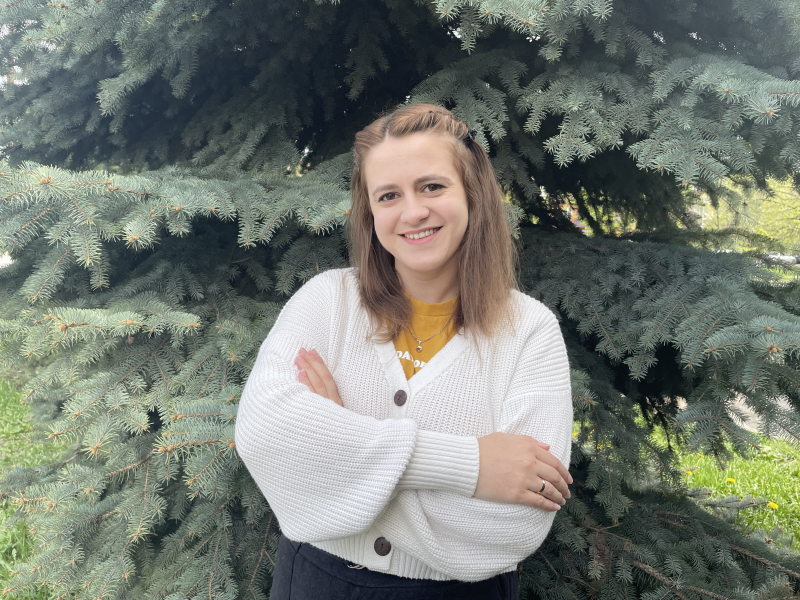
In the first year of my Master’s degree and before the launch of ITMO.Mentors, I assisted my supervisor Marina Kustikova with the course Metrology, Standardization and Certification. I have always enjoyed teaching: coming from a family of lecturers, I have been working as a physics tutor for about four years. But I hadn’t had the chance to work with university students before, so I was eager to try.
The program’s structure
At ITMO.Mentors I continued teaching lectures and practical classes for the same course. My supervisor had several mentors helping her, so we were able to share our responsibilities. I was mainly working on preparing materials for lectures, while my two colleagues focused on practical classes. We got together over Zoom and discussed the topic and best structure for each class. In order to engage students more, we tried to include more practice-oriented tasks. It was a success: sometimes we even heard our students giggling as they read the problems, because it wasn’t something standard and boring – instead, it was diverse and interesting. We tested their knowledge with polls and quizzes, aiming to avoid typical paper-based tests. This way, after every class our students could see their progress and results on the scoreboard.
I think the open class that was attended by the contest’s experts was a success. We chose to make it a lecture, because that way it was easier for me to engage with a bigger audience. This class also happened to be a checkpoint in the course that would define the results of students for a whole block. Another thing we changed was the incentives: when usually our students only received points for giving a correct answer, that day we also offered them sweets. At that class I was really nervous and I am grateful to my supervisor for supporting me from the back of the classroom. I was shocked when I learned that I won. I knew how many mentors worked at ITMO and all of them deserved to win.
Benefits of the program
I find mentorship a cool initiative. When I was a Bachelor’s student myself, I wished I had someone my age who I could ask questions about the course – and my students had this opportunity. Thanks to the program, I had the chance to work with a large audience of 90 people who have their own opinions and can evaluate the information they are offered at the course. All in all, I really miss teaching and especially the thrill of coming up with ideas for a class. These days I am getting ready to enter a PhD program in the field of robotics and mechatronics.




